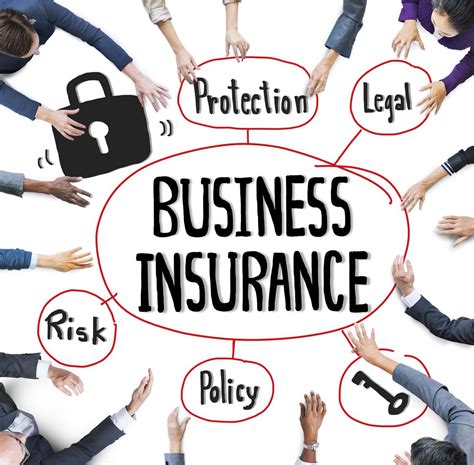Small Business Insurance

Insurance is an essential aspect of running a business, regardless of its size. For small business owners, understanding the different types of insurance and how they can protect their ventures is crucial. This article aims to provide an in-depth guide to small business insurance, covering various aspects from the importance of coverage to real-world examples and expert insights.
Understanding the Importance of Small Business Insurance

In the dynamic landscape of entrepreneurship, safeguarding your small business is paramount. The world of commerce is unpredictable, and unforeseen events can have a significant impact on your operations, employees, and customers. This is where small business insurance steps in as a crucial tool to mitigate risks and ensure the long-term viability of your venture.
Small business insurance serves as a financial safety net, protecting you from potential losses due to a range of unforeseen circumstances. Whether it's property damage, liability claims, or unexpected disruptions to your operations, having the right insurance coverage can mean the difference between a minor setback and a catastrophic blow to your business.
The Role of Insurance in Risk Management
Risk management is an integral part of business strategy, and insurance plays a pivotal role in this process. By identifying potential risks and acquiring appropriate insurance policies, small business owners can proactively manage these risks, ensuring that their operations remain resilient and adaptable to various challenges.
For instance, consider a small retail store owner. By investing in property insurance, they can protect their business against losses from fire, theft, or natural disasters. Similarly, general liability insurance can provide coverage for accidents or injuries that may occur on their premises, helping to mitigate potential lawsuits and associated costs.
| Insurance Type | Coverage |
|---|---|
| Property Insurance | Protects against physical damage to your business property. |
| General Liability Insurance | Covers claims arising from accidents or injuries on your premises. |
| Product Liability Insurance | Protects against claims related to defective products. |
| Professional Liability Insurance | Covers legal costs and damages for professional errors or omissions. |

Types of Small Business Insurance and Their Applications

The world of small business insurance is diverse, offering a range of policies tailored to specific business needs. Let’s explore some of the key types of insurance and their applications in the small business context.
Property Insurance
Property insurance is a cornerstone of small business coverage. It provides protection for your business premises, equipment, inventory, and other physical assets. This type of insurance is particularly crucial for businesses that operate out of a physical location or have valuable assets that could be at risk of damage or theft.
For example, imagine a restaurant owner who invests in property insurance. In the event of a fire or water damage, this insurance would cover the cost of repairs, replacements, and potential loss of income while the restaurant is non-operational. Without such coverage, the financial burden could be devastating.
General Liability Insurance
General liability insurance is a broad policy that covers a range of common liability risks. It provides protection against claims arising from accidents, injuries, or property damage that occur on your business premises or as a result of your business operations.
Consider a small consulting firm. General liability insurance would protect them against claims of bodily injury or property damage that may occur during client meetings or while working on-site at a client's office. This type of insurance is vital for businesses that interact with the public or operate in potentially hazardous environments.
Product Liability Insurance
Product liability insurance is designed to protect businesses that manufacture, distribute, or sell tangible products. This insurance covers claims arising from defective products that cause harm or property damage to consumers.
Take a small electronics manufacturer as an example. Product liability insurance would provide coverage if their products malfunctioned and caused harm to consumers. This insurance is essential to mitigate the financial risks associated with product recalls or lawsuits resulting from defective products.
Professional Liability Insurance
Professional liability insurance, often referred to as errors and omissions (E&O) insurance, is tailored for businesses that provide professional services. It protects against claims arising from mistakes, errors, or negligence in the services provided by the business.
A graphic design studio, for instance, would benefit from professional liability insurance. This policy would cover legal costs and potential damages if a client sued for financial loss resulting from an error in the design studio's work, such as a missed deadline or a design flaw that caused a product launch to fail.
Choosing the Right Insurance Coverage for Your Small Business
Selecting the appropriate insurance coverage for your small business is a critical decision that requires careful consideration. It’s not just about finding the cheapest policy; it’s about ensuring that your unique business needs are adequately addressed.
Assessing Your Business Risks
The first step in choosing the right insurance is to thoroughly assess the risks specific to your business. This involves identifying potential hazards, vulnerabilities, and areas where your business could be exposed to financial loss. A comprehensive risk assessment will help you prioritize the types of insurance coverage that are most crucial for your business.
For instance, if you own a technology startup, you might face risks such as data breaches, cyber attacks, or intellectual property infringement. In this case, cyber liability insurance and intellectual property insurance would be essential additions to your insurance portfolio.
Customizing Your Insurance Portfolio
Small business insurance is not a one-size-fits-all proposition. Every business has unique needs, and insurance policies can be tailored to address these specific requirements. Whether it’s adjusting coverage limits, adding endorsements, or bundling multiple policies, customization is key to ensuring your business is adequately protected.
Consider a small e-commerce business that primarily operates online. While they may not need extensive property insurance, they might require robust cyber liability insurance to protect against online threats and data breaches. By working with an insurance broker or agent, you can create a customized insurance portfolio that aligns with your business's specific needs and risks.
Working with Insurance Professionals
Navigating the complex world of small business insurance can be daunting, which is why working with insurance professionals is often a wise choice. Insurance brokers and agents can provide expert guidance, helping you understand the intricacies of different policies and ensuring you make informed decisions about your coverage.
These professionals can offer valuable insights based on their experience working with a variety of small businesses. They can advise on the types of insurance most relevant to your industry, help you negotiate better rates, and provide ongoing support to ensure your insurance needs evolve alongside your business.
The Impact of Small Business Insurance on Growth and Sustainability
Small business insurance is not merely a financial expense; it’s an investment in the long-term growth and sustainability of your venture. By providing a safety net against potential losses, insurance empowers small businesses to focus on their core operations and strategic growth initiatives without the constant worry of unforeseen risks.
Facilitating Business Growth
Having the right insurance coverage can open doors to new business opportunities. For instance, many clients or partners require proof of insurance before engaging in business transactions. This is particularly true for larger enterprises that may require small businesses to have certain insurance policies in place as a condition of doing business.
Moreover, insurance can provide the financial stability needed to pursue expansion plans. With the knowledge that your business is protected against potential losses, you can allocate resources more confidently towards growth strategies, whether that involves hiring new talent, investing in marketing campaigns, or developing innovative products and services.
Ensuring Business Sustainability
In the face of unexpected challenges, small business insurance acts as a critical buffer, helping businesses survive and recover. Whether it’s a natural disaster, a lawsuit, or a cyber attack, having the right insurance coverage can mean the difference between weathering the storm and being forced to close your doors.
For example, a small business that experiences a cyber attack may face significant financial burdens from the cost of repairing their systems, dealing with legal issues, and potential business interruption. With cyber liability insurance in place, the business can focus on recovery rather than being overwhelmed by financial setbacks.
The Future of Small Business Insurance

As the business landscape continues to evolve, so too does the world of small business insurance. New risks and challenges are constantly emerging, driving the development of innovative insurance solutions. Here’s a glimpse into the future of small business insurance and how it may impact your venture.
Emerging Risks and Insurance Innovations
With advancements in technology and changes in consumer behavior, new risks are emerging that require innovative insurance solutions. For instance, the rise of remote work and the gig economy has led to a surge in demand for portable insurance policies that can cover employees regardless of their physical location or employment status.
Additionally, the growing prevalence of cyber threats has spurred the development of more comprehensive cyber liability insurance policies. These policies not only cover the cost of data breaches but also provide resources for businesses to improve their cyber security measures and respond effectively to potential attacks.
The Role of Technology in Insurance
Technology is revolutionizing the insurance industry, making it more accessible and efficient for small businesses. Digital platforms and mobile apps are simplifying the insurance buying process, allowing small business owners to compare policies, obtain quotes, and purchase coverage with just a few clicks.
Furthermore, data analytics and artificial intelligence are being leveraged to develop more accurate risk assessment models. These technologies enable insurance providers to offer more precise and personalized insurance policies, ensuring small businesses receive the coverage they need without paying for unnecessary add-ons.
Conclusion: The Evolving Landscape of Small Business Insurance
In conclusion, small business insurance is a dynamic and ever-evolving field, offering a safety net for entrepreneurs navigating the complexities of the business world. By understanding the importance of insurance, assessing their unique risks, and staying abreast of emerging trends and innovations, small business owners can ensure they have the coverage they need to thrive and grow.
As the business landscape continues to transform, small business insurance will play an increasingly critical role in protecting the financial health and sustainability of small ventures. By staying informed and working with insurance professionals, small business owners can make strategic decisions about their insurance coverage, ensuring they are prepared for whatever the future holds.
What are the most common types of insurance claims made by small businesses?
+The most common insurance claims made by small businesses include property damage due to fire, water, or theft; liability claims arising from accidents or injuries on business premises; and professional liability claims related to errors or omissions in service delivery.
How can small business owners save money on insurance premiums without compromising coverage?
+Small business owners can save on insurance premiums by shopping around for competitive rates, bundling policies with the same insurer, maintaining a good credit score, and implementing risk management strategies to reduce potential claims.
What are some red flags to watch out for when choosing an insurance provider for your small business?
+Red flags when choosing an insurance provider include lack of transparency in policy details, poor customer service ratings, frequent policy changes or cancellations, and a history of financial instability. It’s crucial to research and choose a reputable insurer.



